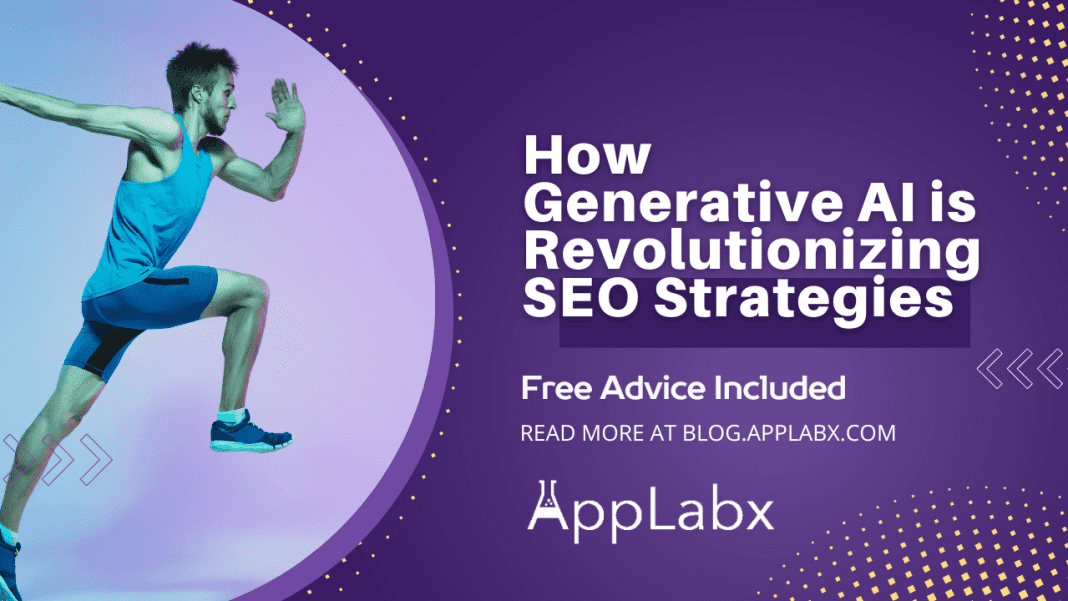Key Takeaways
- Generative AI empowers businesses with automation, personalization, and optimization, revolutionizing SEO strategies for enhanced organic traffic and user experience.
- Leveraging generative AI in keyword research and content creation streamlines processes, improves search engine visibility, and drives targeted organic traffic.
- Embracing generative AI as a collaborative tool and addressing future implications and challenges ensures responsible usage and positions businesses for success in the evolving digital landscape. Stay ahead with generative AI-powered SEO strategies.
In the ever-evolving digital landscape, search engine optimization (SEO) has become a crucial element for businesses and website owners striving to achieve online success.
As technology continues to advance, a revolutionary force has emerged, reshaping the way SEO strategies are crafted and executed. This force is none other than generative artificial intelligence (AI).
Generative AI, a subset of artificial intelligence, is making waves across industries by enabling machines to produce original and creative content.
With its ability to generate text, images, and even videos, generative AI has taken center stage, captivating the attention of SEO professionals worldwide.
By harnessing the power of generative AI, businesses are revolutionizing their SEO strategies and unlocking a myriad of untapped opportunities.
So, what exactly is generative AI and how does it differ from traditional AI techniques?
Generative AI refers to a set of algorithms and models that can produce new and unique content, imitating human-like creativity.
Unlike traditional AI, which relies on pre-defined rules and patterns, generative AI leverages deep learning and neural networks to generate novel outputs based on training data. This groundbreaking technology has paved the way for a new era of SEO, where automation and innovation go hand in hand.
The impact of generative AI on SEO strategies is profound. SEO professionals constantly face the challenge of keeping up with the ever-changing search engine algorithms and finding creative ways to enhance their website’s visibility.
Generative AI offers a game-changing solution by automating and augmenting several aspects of SEO, empowering businesses to stay ahead of the curve.
One of the key areas where generative AI shines is keyword research and optimization.
Keywords play a pivotal role in driving organic traffic to websites, but identifying the right keywords can be a daunting task.
Generative AI algorithms can analyze vast amounts of data, including search queries and user behavior, to generate relevant and high-performing keywords.
This not only saves valuable time but also ensures that businesses target the most effective keywords to improve their search engine rankings.
Content creation is another area where generative AI is revolutionizing SEO strategies.
Crafting engaging and informative content is crucial for attracting and retaining website visitors.
However, consistently generating fresh and compelling content can be a significant challenge.
Generative AI comes to the rescue by assisting in content creation, allowing SEO professionals to generate unique blog posts, articles, and product descriptions.
By harnessing generative AI, businesses can ensure a steady stream of high-quality content that resonates with their target audience.
Moreover, generative AI enhances content optimization by providing data-driven insights.
It can analyze existing content, identify areas for improvement, and suggest changes to maximize its SEO potential.
From optimizing meta tags and headings to improving readability and keyword density, generative AI algorithms can elevate content to new heights, leading to better search engine visibility and increased organic traffic.
User experience is a critical factor in SEO success, and generative AI plays a significant role in enhancing it.
By analyzing user behavior and preferences, generative AI algorithms can personalize content recommendations, ensuring that visitors are presented with relevant and engaging material.
Additionally, generative AI can optimize website design and layout, making it more visually appealing and intuitive for users.
These improvements contribute to longer dwell times, lower bounce rates, and ultimately higher search engine rankings.
While the impact of generative AI on SEO strategies is remarkable, it’s important to acknowledge the future implications and challenges that accompany this technology.
As generative AI continues to evolve, new possibilities and ethical considerations arise. SEO professionals must stay informed about the latest developments and adapt their strategies accordingly to remain at the forefront of this transformative wave.
Generative AI is revolutionizing SEO strategies, propelling businesses to new heights of online success.
By leveraging the power of generative AI for keyword research, content creation, optimization, and user experience enhancement, SEO professionals can unlock untapped potential and outperform their competitors.
As the digital landscape continues to evolve, embracing generative AI is not just a choice but a necessity for those seeking to thrive in the dynamic world of SEO.
So, fasten your seatbelts as we embark on an exhilarating journey through the realm of generative AI and its transformative impact on SEO strategies.
Before we write more about this article, we like to share who we are.
About AppLabx
From developing a solid marketing plan to creating compelling content, optimizing for search engines, leveraging social media, and utilizing paid advertising, AppLabx offers a comprehensive suite of digital marketing services designed to drive growth and profitability for your business.
AppLabx is well known for helping companies and startups use search engine optimisation to drive web traffic to their websites and web apps.
At AppLabx, we understand that no two businesses are alike. That’s why we take a personalized approach to every project, working closely with our clients to understand their unique needs and goals, and developing customized strategies to help them achieve success.
If you need a digital consultation, then send in an inquiry here.
How Generative AI is Revolutionizing SEO Strategies
- Understanding Generative AI
- The Role of Generative AI in SEO
- Keyword Research and Optimization with Generative AI
- Content Creation and Optimization
- Enhancing User Experience with Generative AI
- Future Implications and Challenges
1. Understanding Generative AI

Generative artificial intelligence (AI) is a groundbreaking subset of AI that has gained significant attention and recognition for its ability to produce original and creative content.
Unlike traditional AI techniques that rely on predefined rules and patterns, generative AI leverages deep learning and neural networks to generate new and unique outputs based on training data.
In the context of SEO strategies, understanding generative AI is essential to unlock its full potential and explore the possibilities it offers.
One of the most notable examples of generative AI in action is in the field of natural language processing (NLP).
NLP models, such as OpenAI’s GPT-3, have made remarkable strides in generating human-like text.
These models can produce coherent and contextually relevant sentences, paragraphs, and even entire articles.
By training on vast amounts of text data, generative AI algorithms can understand the patterns, grammar, and semantics of human language, enabling them to generate highly readable and contextually accurate content.
For instance, imagine a scenario where an SEO professional needs to generate engaging and informative blog posts on various topics. Instead of spending hours brainstorming and writing content manually, generative AI can step in to automate the process.
By providing a topic or a set of keywords as input, generative AI algorithms can generate complete blog posts that adhere to the desired tone, style, and structure.
This not only saves time but also ensures a consistent flow of high-quality content for SEO purposes.
Another fascinating application of generative AI is in the realm of image generation.
Deep generative models, such as generative adversarial networks (GANs), have demonstrated astonishing capabilities in creating realistic and visually appealing images.
These models are trained on large datasets of images and can generate new images that resemble those in the training data.

This opens up exciting possibilities for SEO strategies that heavily rely on visual content.
For example, an e-commerce website selling furniture may face challenges in obtaining high-quality product images for every item in their inventory.
Generative AI can come to the rescue by generating realistic product images based on the available data.
By training the generative AI model on a collection of furniture images, the algorithm can generate new images of furniture pieces that appear authentic and visually appealing.

This empowers the website to showcase a wider range of products, enhance the user experience, and ultimately drive more traffic and conversions.
Furthermore, generative AI has made significant advancements in the generation of videos and animations.
Deep learning models can now generate animated sequences, such as short video clips or even entire movies.
This has tremendous implications for SEO strategies that rely on video content, such as video marketing campaigns or product demonstrations.
For instance, consider a scenario where a business wants to create a promotional video for a new product launch.
Instead of investing significant resources in video production, generative AI can be leveraged to generate visually stunning and engaging animated sequences.
By providing a description or a storyboard as input, the generative AI model can create a customized video that aligns with the brand’s aesthetics and messaging.
This enables businesses to create compelling video content efficiently, enhancing their SEO strategies and captivating their target audience.
It is important to note that while generative AI has demonstrated impressive capabilities, it still has limitations.
Generating content that is truly indistinguishable from human-created content remains a challenge, and there may be instances where the generated outputs require manual review and refinement.
Additionally, the ethical considerations surrounding generative AI, such as the potential misuse of generated content or the risk of promoting misinformation, need to be carefully addressed and monitored.
Understanding generative AI is key to harnessing its transformative power in SEO strategies.
By leveraging its capabilities in natural language processing, image generation, and video creation, businesses can automate content production, enhance user experience, and drive organic traffic.
However, it is crucial to remain aware of the limitations and ethical considerations associated with generative AI.
By combining human expertise with generative AI’s creative potential, businesses can unlock new horizons in the realm of SEO.
2. The Role of Generative AI in SEO
Generative artificial intelligence (AI) is revolutionizing the field of search engine optimization (SEO) by offering unprecedented capabilities and transforming traditional SEO strategies.
Generative AI, with its ability to generate original and creative content, plays a crucial role in enhancing various aspects of SEO, including keyword research, content creation, and user experience optimization.
Understanding the role of generative AI in SEO is essential for businesses and website owners seeking to stay ahead in the competitive digital landscape.
One of the primary areas where generative AI excels in SEO is keyword research and optimization.
Keywords are the foundation of SEO, as they determine the visibility of a website in search engine results pages (SERPs).
Generative AI algorithms can analyze vast amounts of data, including search queries, user behaviour, and historical trends, to generate relevant and high-performing keywords.
For instance, imagine an e-commerce website specializing in outdoor gear.
Traditionally, SEO professionals would manually research keywords related to outdoor activities, camping, hiking, and other relevant topics.
However, generative AI can expedite this process by analyzing large datasets of search queries and generating a comprehensive list of keywords aligned with the website’s niche.
This empowers businesses to target the most effective keywords, optimize their content, and improve their search engine rankings.
To understand more about Keyword Research, have a read at our article “Keyword Research 101: A Beginner’s Guide to Ranking Higher on Search Engines”.
Content creation is another crucial aspect of SEO, and generative AI is transforming the way content is generated and optimized.
Traditional content creation can be time-consuming and challenging, requiring constant brainstorming and writing efforts.
Generative AI algorithms, trained on extensive datasets, can generate human-like text, enabling SEO professionals to automate content creation and maintain a consistent flow of high-quality content.
For example, a travel blog aiming to publish frequent and engaging articles about different destinations can leverage generative AI to automate content creation. By providing the generative AI model with a set of keywords or a specific topic, the algorithm can generate complete articles that align with the desired style and tone of the blog. This not only saves time and resources but also ensures a steady stream of informative and captivating content for readers, leading to increased website traffic and improved SEO performance.
Generative AI also plays a crucial role in optimizing content for search engines.
Search engines consider various factors, such as keyword relevance, readability, and user engagement, when ranking web pages.
Generative AI algorithms can analyze existing content, identify areas for improvement, and provide data-driven insights to optimize the content for better search engine visibility.
For instance, consider a website offering financial advice and resources. By utilizing generative AI, SEO professionals can analyze the website’s existing articles and identify opportunities for optimization. The generative AI model can suggest changes to improve keyword density, sentence structure, and readability, ensuring that the content aligns with search engine algorithms and user preferences. This optimization process enhances the website’s visibility, increases organic traffic, and improves overall SEO performance.
User experience is a critical factor in SEO success, and generative AI contributes significantly to enhancing it.
By analyzing user behavior, preferences, and historical data, generative AI algorithms can personalize content recommendations, ensuring that visitors are presented with relevant and engaging material.
This personalization not only improves user satisfaction but also increases the likelihood of longer dwell times and lower bounce rates, which are positive signals for search engine algorithms.
For example, an online retail store can leverage generative AI to personalize product recommendations based on individual user preferences and past purchase history. By employing collaborative filtering techniques and generative AI algorithms, the website can present personalized product recommendations to each visitor, improving their browsing experience and increasing the likelihood of conversions. This user-centric approach enhances the website’s SEO performance by promoting user engagement and satisfaction.
It’s important to note that while generative AI offers significant advantages in SEO, it’s not a complete replacement for human expertise.
SEO professionals should utilize generative AI as a powerful tool in their arsenal, combining it with their knowledge and experience to achieve optimal results.
Additionally, ethical considerations should be taken into account when using generative AI, such as ensuring the authenticity and integrity of generated content.
In conclusion, generative AI plays a pivotal role in transforming SEO strategies by enhancing keyword research, content creation, optimization, and user experience.
By leveraging generative AI algorithms, businesses can streamline their SEO efforts, generate high-quality content at scale, and deliver personalized experiences to their audience.
Incorporating generative AI into SEO strategies enables businesses to stay competitive in the ever-evolving digital landscape and maximize their online visibility and success.
3. Keyword Research and Optimization with Generative AI

Keyword research and optimization play a crucial role in search engine optimization (SEO), helping businesses improve their visibility, attract targeted traffic, and increase their online presence.
With the emergence of generative artificial intelligence (AI), the process of keyword research and optimization has undergone a significant transformation.
Generative AI algorithms can analyze vast amounts of data, identify relevant keywords, and optimize content to align with search engine algorithms.
This section explores how generative AI is revolutionizing keyword research and optimization, along with relevant examples to showcase its impact.
- Advanced Keyword Discovery: Generative AI enables businesses to discover new and relevant keywords that might have been overlooked through traditional research methods. By analyzing massive datasets, user behavior patterns, and industry trends, generative AI algorithms can identify emerging keywords that have high search volume and low competition. This gives businesses a competitive advantage by uncovering untapped keyword opportunities. For example, a fashion retailer using generative AI for keyword research may discover rising trends such as “sustainable fashion,” “ethical clothing,” or “slow fashion,” and optimize their content accordingly to attract eco-conscious consumers.
- Enhanced Keyword Analysis: Generative AI algorithms provide in-depth keyword analysis, allowing businesses to understand the search intent behind specific keywords and optimize their content accordingly. By examining user queries, generative AI algorithms can decipher the underlying context, helping businesses tailor their content to match user intent. For instance, a travel website using generative AI for keyword analysis may identify that users searching for “best travel destinations” are primarily interested in articles or guides, while users searching for “cheap flights to Europe” are looking for booking options. This insight enables businesses to create targeted content and deliver a more satisfying user experience.
- Content Optimization with AI-generated Suggestions: Generative AI can assist in optimizing content by generating AI-generated suggestions for keyword placement and content structure. By analyzing existing content and search engine algorithms, generative AI algorithms can recommend specific keywords to include, suggest optimal keyword density, and provide guidance on the overall content structure. For example, a blog writer using generative AI for content optimization may receive suggestions to include relevant long-tail keywords in specific sections of their article to improve search engine rankings and attract organic traffic.
- Dynamic and Adaptive Optimization: Generative AI algorithms enable dynamic and adaptive optimization of keywords based on real-time data and user behavior. These algorithms can analyze user interactions, click-through rates, and conversion rates to determine the effectiveness of selected keywords. If certain keywords are not performing well, the generative AI model can automatically suggest alternative keywords or modifications to improve SEO performance. This real-time adaptability ensures that businesses stay ahead of changing search trends and maintain their competitive edge. For example, an e-commerce website using generative AI for dynamic keyword optimization may identify that a specific keyword is losing popularity and recommend alternative keywords to maintain visibility and attract relevant traffic.
- Multilingual Keyword Research: Generative AI can assist in multilingual keyword research, allowing businesses to optimize their content for a global audience. By analyzing language patterns, search queries, and regional trends, generative AI algorithms can identify relevant keywords in different languages and regions. This is particularly beneficial for businesses operating in international markets or targeting specific language demographics. For instance, an online language learning platform using generative AI for multilingual keyword research may identify keywords related to “French language courses” in English-speaking regions and “cursos de español” in Spanish-speaking regions, optimizing their content accordingly to reach diverse audiences.
Ggenerative AI has revolutionized keyword research and optimization in SEO strategies, providing businesses with advanced capabilities for discovering new keywords, analyzing search intent, optimizing content, and adapting to dynamic search trends.
By leveraging generative AI, businesses can stay ahead in the competitive digital landscape, attract targeted organic traffic, and deliver relevant and engaging content to their audience.
Integrating generative AI into keyword research and optimization processes can unlock new opportunities, improve search engine rankings, and drive the success of SEO strategies in the ever-evolving online ecosystem.
Also read our article on “The Importance of Keyword Research in SEO: Boosting Your Website’s Visibility”.
4. Content Creation and Optimization

Content creation and optimization are crucial components of effective search engine optimization (SEO) strategies.
High-quality and optimized content not only attracts organic traffic but also engages users, improves user experience, and boosts search engine rankings.
With the advent of advanced technologies like generative artificial intelligence (AI), businesses now have powerful tools to streamline and enhance their content creation and optimization processes, ensuring maximum impact and visibility in the digital landscape.
Generative AI has revolutionized content creation by enabling businesses to automate and scale their content production efforts.
Traditional content creation can be time-consuming and resource-intensive, requiring extensive research, writing, and editing.
Generative AI algorithms, on the other hand, can analyze vast datasets, understand language patterns, and generate human-like text, saving valuable time and resources for businesses.
For example, imagine a blog that covers various topics such as technology, fashion, and travel. Instead of manually researching and writing multiple articles on a regular basis, the blog can leverage generative AI to automate content creation. By providing relevant keywords or topic prompts, the generative AI model can generate complete articles, aligning with the desired style, tone, and structure of the blog. This streamlines the content creation process, ensures a consistent flow of engaging content, and frees up resources for other critical tasks.
Generative AI also plays a significant role in optimizing content for search engines.
Search engines consider various factors, such as keyword relevance, readability, and user engagement, when ranking web pages.
Generative AI algorithms can analyze existing content, identify areas for improvement, and provide data-driven insights to optimize the content for better search engine visibility.
For instance, a business offering financial advice may have a blog post that requires optimization for specific keywords related to financial planning. By utilizing generative AI, SEO professionals can input the existing content into the generative AI model. The model can then analyze the text, suggest changes to improve keyword density, sentence structure, and readability, ensuring that the content aligns with search engine algorithms and user preferences. This optimization process enhances the website’s visibility, increases organic traffic, and improves overall SEO performance.
Generative AI also empowers businesses to create personalized and dynamic content experiences for their audience.
By leveraging user data and preferences, generative AI algorithms can generate tailored content recommendations, enhancing user engagement and satisfaction.
For example, an e-commerce website can use generative AI to create personalized product recommendations based on individual user preferences, browsing history, and purchase behavior. By employing collaborative filtering techniques and generative AI algorithms, the website can present relevant product recommendations to each visitor, increasing the likelihood of conversions and improving user experience. This user-centric approach not only boosts user engagement but also sends positive signals to search engine algorithms, improving the website’s SEO performance.
In addition to text-based content, generative AI has made significant advancements in generating visual content.
Visual elements, such as images and videos, are essential for engaging users and conveying information effectively.
Generative AI algorithms can analyze large datasets of visual content, learn patterns, and generate new images or videos that align with specific requirements.
For instance, a business in the fashion industry may require high-quality product images for their online store. Generative AI can be leveraged to generate realistic product images based on existing inventory or design specifications. By training the generative AI model on a collection of fashion-related images, the algorithm can generate new images of clothing items that appear authentic and visually appealing. This enables the business to showcase a wider range of products, enhance the user experience, and ultimately drive more traffic and conversions.
It’s important to note that while generative AI offers significant advantages in content creation and optimization, it should not replace human creativity and expertise.
Generative AI algorithms can serve as powerful tools, but human input is necessary to ensure the authenticity, relevance, and ethical considerations of the content generated.
Generative AI has revolutionized content creation and optimization by automating and enhancing the process.
By leveraging generative AI algorithms, businesses can streamline their content production efforts, optimize their content for better search engine visibility, and deliver personalized and engaging experiences to their audience.
Incorporating generative AI into content strategies allows businesses to stay competitive in the digital landscape, attract organic traffic, and improve overall SEO performance.
And at this point in time, if you are thinking of hiring top-class SEO and Generative AI marketers, then try 9cv9 SEO Hiring Portal, the world’s leading SEO Marketer Hiring Job Portal for Employers.
5. Enhancing User Experience with Generative AI

User experience (UX) is a critical factor in the success of any online business or website.
A positive and engaging user experience not only improves customer satisfaction but also leads to increased user engagement, higher conversion rates, and improved search engine rankings.
Generative artificial intelligence (AI) has emerged as a powerful tool for enhancing user experience by providing personalized, interactive, and dynamic content and interactions.
By leveraging generative AI, businesses can create seamless and tailored experiences that captivate users and drive the desired actions.
One of the key ways generative AI enhances user experience is through personalized content recommendations.
Generative AI algorithms can analyze vast amounts of user data, including browsing history, preferences, and behavior, to generate personalized recommendations for products, services, or content.
This level of personalization creates a sense of relevance and connection, increasing user engagement and satisfaction.
For example, consider an online retail store that sells clothing. By utilizing generative AI, the store can analyze a user’s past purchases, browsing history, and style preferences to generate personalized product recommendations. These recommendations can be showcased on the homepage, product pages, or through targeted emails. By presenting users with products that align with their preferences and interests, the store enhances the user experience, making the shopping process more enjoyable and increasing the likelihood of conversions.
Generative AI also plays a crucial role in creating interactive and immersive user experiences.
Through the use of chatbots, virtual assistants, or conversational interfaces, generative AI can engage users in dynamic and interactive conversations, providing information, support, and assistance in real-time.
For instance, a travel booking website can employ a chatbot powered by generative AI to assist users in planning their trips. The chatbot can understand natural language queries, provide personalized recommendations for destinations, accommodations, and activities, and even assist in booking flights or making reservations. By offering a conversational and interactive experience, the website enhances user engagement, simplifies the decision-making process, and improves overall satisfaction.
Generative AI also enables businesses to create dynamic and adaptive user interfaces that adjust based on user preferences and behavior.
Through real-time analysis of user interactions, generative AI algorithms can modify the layout, design, and content presentation to optimize the user experience.
For example, a news website can leverage generative AI to customize the content layout based on a user’s reading preferences. By analyzing the types of articles a user engages with, the generative AI model can adapt the website’s interface to highlight similar articles or topics of interest. This personalized approach improves the user experience by delivering relevant content in a visually appealing and intuitive manner, increasing user satisfaction and encouraging further exploration of the website.
Generative AI can also enhance user experience by generating dynamic and interactive visual content.
For instance, generative AI algorithms can generate personalized videos or visualizations based on user preferences and inputs.
Consider a fitness app that offers personalized workout routines. By leveraging generative AI, the app can generate video demonstrations of exercises based on a user’s fitness level, goals, and equipment availability. The generative AI model can dynamically adapt the video content to match the user’s preferences, providing a tailored and interactive workout experience. This not only enhances the user experience but also increases the effectiveness and engagement of the workout routines.
Furthermore, generative AI can assist in sentiment analysis and emotion detection, allowing businesses to understand and respond to user feedback and emotions effectively.
By analyzing user comments, social media posts, or customer reviews, generative AI algorithms can identify positive or negative sentiments, enabling businesses to address concerns, improve their products or services, and deliver a more empathetic user experience.
In conclusion, generative AI is revolutionizing the way businesses enhance user experience. By providing personalized recommendations, creating interactive interfaces, and generating dynamic content, generative AI enables businesses to create engaging and tailored experiences that captivate users and drive desired actions.
By leveraging generative AI, businesses can stay competitive in the digital landscape, increase user satisfaction, and improve overall SEO performance.
Incorporating generative AI into UX strategies is crucial for businesses looking to create memorable and impactful user experiences in the modern digital era.
6. Future Implications and Challenges of Generative AI
Generative artificial intelligence (AI) has made significant advancements and has already transformed various industries, including search engine optimization (SEO) and user experience (UX).
However, as with any emerging technology, there are future implications and challenges that businesses and society need to consider.
Understanding these implications and addressing the associated challenges is crucial for harnessing the full potential of generative AI while ensuring ethical and responsible usage.
One of the future implications of generative AI is its impact on job roles and workflows.
As generative AI algorithms become more sophisticated, there is a possibility of automation replacing certain tasks traditionally performed by humans.
For example, content creation and optimization can be streamlined with generative AI, reducing the need for manual writing and editing.
While this automation can improve efficiency, it also raises concerns about job displacement and the need for upskilling or retraining the workforce.
However, it is important to note that generative AI should be viewed as a tool to augment human capabilities rather than replace them entirely. Humans bring creativity, critical thinking, and ethical judgment to the table, which are essential in content strategy, decision-making, and problem-solving.
By embracing generative AI as a collaborative tool, businesses can leverage its capabilities while empowering their workforce to focus on higher-value tasks.
Another future implication of generative AI is its potential to revolutionize user interfaces and interactions.
Natural language processing and speech recognition advancements in generative AI can lead to more conversational interfaces, voice-activated systems, and even virtual assistants.
This has the potential to reshape how users interact with technology, making it more intuitive, seamless, and personalized.
For instance, virtual assistants like Amazon’s Alexa and Google Assistant are already leveraging generative AI to provide voice-based assistance and personalized recommendations.
However, as generative AI progresses, challenges such as data privacy and security become more critical.
Voice-activated systems and conversational interfaces collect and process vast amounts of user data.
It is essential for businesses to prioritize data protection, transparency, and user consent to address privacy concerns.
By implementing robust data governance practices and complying with relevant regulations, businesses can build trust with their users and mitigate potential risks associated with generative AI technologies.
Ethical considerations are another significant challenge related to generative AI.
While generative AI algorithms are capable of generating content, images, and videos, there is a risk of misuse or malicious intent.
For example, deepfake technology powered by generative AI can be used to create misleading or fabricated media, raising concerns about misinformation and its impact on society.
Businesses and policymakers must proactively address these challenges by promoting responsible AI usage, implementing ethical frameworks, and developing mechanisms for detecting and mitigating harmful content.
Moreover, ensuring fairness and avoiding biases in generative AI algorithms is crucial.
Bias can inadvertently seep into the training data used by generative AI models, leading to biased content generation or recommendations.
Businesses must invest in diverse and representative training datasets and employ robust testing and evaluation mechanisms to detect and mitigate biases.
By promoting fairness and inclusivity, generative AI can be a force for positive change in delivering equitable and unbiased user experiences.
Additionally, the rapid pace of technological advancements in generative AI presents challenges in terms of regulation and policy development.
As generative AI continues to evolve, it is essential for policymakers to stay informed and updated to create frameworks that balance innovation, consumer protection, and ethical considerations.
Striking the right balance between fostering innovation and ensuring responsible use of generative AI is crucial for its long-term societal and economic impact.
The future implications of generative AI are promising, but they come with challenges that need to be addressed.
By recognizing the potential impact on job roles, focusing on data privacy and security, addressing ethical considerations, and fostering responsible innovation, businesses can navigate the future of generative AI effectively.
By embracing generative AI as a collaborative tool and considering the societal implications, we can harness its full potential while ensuring a positive and responsible AI-powered future.
Conclusion
Generative artificial intelligence (AI) has ushered in a new era of revolutionized SEO strategies, transforming the way businesses optimize their online presence and connect with their target audience.
The power of generative AI lies in its ability to analyze vast amounts of data, generate human-like content, and deliver personalized experiences that captivate users and drive organic traffic.
Throughout this blog, we have explored the various ways in which generative AI is shaping the landscape of SEO and its implications for businesses.
First, we discussed the significance of understanding generative AI, delving into its definition and underlying principles. By grasping the fundamentals of generative AI, businesses can harness its potential and leverage its capabilities to enhance their SEO efforts effectively.
Next, we explored the role of generative AI in SEO, highlighting its ability to automate content creation, optimize web pages, and deliver tailored experiences.
We examined real-life examples of businesses utilizing generative AI to streamline their processes and improve their search engine rankings.
By integrating generative AI into SEO strategies, businesses can save time, resources, and effort while achieving better visibility in the highly competitive digital landscape.
We then explored how generative AI revolutionizes keyword research and optimization.
We discussed how generative AI algorithms can analyze vast amounts of data to identify relevant keywords, uncover keyword trends, and optimize content to align with search engine algorithms.
We provided examples of businesses leveraging generative AI to boost their keyword strategies and drive targeted organic traffic to their websites.
Furthermore, we examined the impact of generative AI on content creation and optimization.
Generative AI algorithms can generate high-quality, engaging, and personalized content, enhancing user experience and improving search engine rankings.
We explored how businesses can leverage generative AI to automate content production, optimize existing content, and create dynamic and interactive experiences for their audience.
Moreover, we discussed how generative AI enhances user experience by providing personalized content recommendations, creating interactive interfaces, and generating dynamic visual content.
We explored real-life examples of businesses leveraging generative AI to deliver tailored experiences that engage users, drive conversions, and improve overall satisfaction.
Finally, we delved into the future implications and challenges of generative AI. We addressed concerns regarding job displacement, data privacy and security, ethical considerations, and the need for regulatory frameworks.
By proactively addressing these challenges and promoting responsible AI usage, businesses can embrace generative AI while mitigating risks and ensuring a positive impact on their SEO strategies.
In summary, generative AI is revolutionizing SEO strategies by offering unprecedented capabilities for automation, personalization, and optimization.
By embracing generative AI as a collaborative tool and navigating its implications and challenges, businesses can stay ahead in the evolving digital landscape, attract organic traffic, enhance user experience, and achieve their SEO goals.
As generative AI continues to advance, it is crucial for businesses to stay informed, adapt to the changing landscape, and embrace innovative solutions.
By combining human creativity, expertise, and ethical considerations with the power of generative AI, businesses can unlock the full potential of SEO and thrive in the digital age.
With generative AI as a strategic ally, businesses can revolutionize their SEO strategies and pave the way for future success in the ever-evolving online ecosystem.
If you are looking for a top-class digital marketer, then book a free consultation slot here.
If you find this article useful, why not share it with your friends and business partners, and also leave a nice comment below?
We, at the AppLabx Research Team, strive to bring the latest and most meaningful data, guides, and statistics to your doorstep.
To get access to top-quality guides, click over to the AppLabx Blog.
People Also Ask
What does generative AI mean for SEO?
Generative AI revolutionizes SEO by automating content creation, optimizing keywords, and enhancing user experience. It analyzes data, generates personalized content, and adapts to evolving search trends, driving organic traffic, improving rankings, and delivering impactful SEO strategies.
How will generative AI affect SEO?
Generative AI will have a profound impact on SEO, automating processes like content creation and optimization, improving keyword research, and enhancing user experience. It will streamline workflows, boost organic rankings, and enable businesses to deliver personalized and engaging content, ultimately driving success in the competitive digital landscape.
What is the generative AI concept?
Generative AI is a concept that involves using artificial intelligence algorithms to generate new and original content, such as text, images, or videos. It goes beyond traditional AI approaches by simulating creative and human-like outputs, allowing for innovative applications in various fields, including content creation, design, and problem-solving.
































